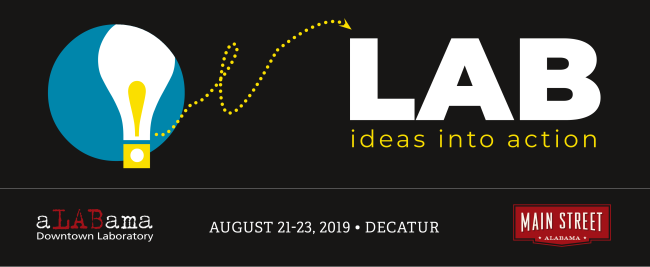Last week I had the pleasure of attending the Main Street Alabama LAB in Decatur, Alabama. This is their annual state-wide Main Street conference, and was a great opportunity to see some familiar friends and faces, and meet some great Main Streeters.
I’ve been to several conferences and I always try to take a few things away from each opportunity, and this year’s LAB was no exception. In fact, there were a few great take-aways.
If you have been around Main Street or downtown revitalization very long you’ve likely heard of Strong Towns. Strong Towns is an organization that is dedicated to making communities financially strong and resilient.
They have a very data-driven approach to thinking about how viable communities are. They look at how communities approach development and redevelopment, and what the return on those investments are. Their founder, Charles Marohn was the keynote speaker at the Alabama LAB and shared some wonderful insights.
In particular, he spoke about how the customer model is a poor model for cities. If you haven’t seen Mr. Mahron speak or aren’t familiar with the work of Strong Towns, that concept may strike you as a bit odd at first. However, when you start to think about what a city is, it makes a lot of sense. In a traditional business, the business exists to serve the customer. If we do the same thing as a city and treat the government as though they are there strictly to serve the citizens, we expose our communities to leveraging our future to please us today. In reality, the government isn’t an entity created to represent us, it is a way for us to collectively come together to address issues that face our entire community. When we shift our perspective and begin to look at how we would invest if our government was a business, we start to evaluate developments based on long-term return rather than short-term gains.
Mr. Mahron is an inspiring public speaker and this approach is certainly something that Main Streeters and downtown developers are quite familiar with (and if not you should be). As a self-admitted data geek I was excited to see that Mr. Mahron would be speaking and his message really struck a chord with me.
One thing that I didn’t know about Strong Towns though, was that they had a podcast. They actually have a few of them, and they are a great tool for anyone interested in this movement we call downtown revitalization.
https://www.strongtowns.org/podcast
You may have noticed lately that AARP is very active. Their marketing has really shifted over the past few years and they now have a great social media presence and are really engaging communities.
One thing I did not know before last week was that AARP actually has grants available. These Community Action grants are a part of their Livable Communities program. From their website:
AARP Livable Communities supports the efforts of neighborhoods, towns, cities and rural areas to be great places for people of all ages. We believe that communities should provide safe, walkable streets; age-friendly housing and transportation options; access to needed services; and opportunities for residents of all ages to participate in community life.
These grants are a great way to spur some action in your communities and jump start that project that just needs a little funding to get it over the finish line. You can find out more at https://www.aarp.org/livable-communities/community-challenge/
Any time I get to see Kathy La Plante it is a pleasure. It’s been a while since I got to attend a session led by Kathy, and her presentation about the importance of retaining leaders did not disappoint. Kathy has a fun way of presenting the information and it was interesting to see how directors and volunteers responded to what Kathy was presenting.
Leadership retention is something we have helped several communities through with Maestro. Your data helps you build what we refer to as institutional knowledge. When you have a transition of leadership, whether at the staff or volunteer levels, it can be tough to keep everyone on the same page and keep the momentum your organization has built. We’re glad that Maestro is a tool that helps organizations through these transitions, and Kathy’s session certain affirmed some of the things that we have been working on.
While I always like to get 3 big take-aways, there are always little things that you can bring back to share with your community. Here’s some of those quick items that I thought were worth sharing:
